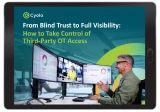How many external vendors, contractors, and/or OEMs have access to your OT environment at this moment? Could it be 25, 150, or even 300?
Cyolo's latest research found that 60% of manufacturers allow more than 100 third-party vendors to remotely access their OT systems – and 32% permit such access for more than 250 vendors.
There's no questioning the value that third-party experts and specialists provide. But that doesn't mean you should blindly trust dozens or even hundreds of external contractors to roam freely inside your most critical environments.
So, what's the answer to improving third-party access security? You might expect that adding tighter controls would slow your vendors down, but it turns out the opposite is true.
Controlling third-party access doesn’t just lower risk. It also increases productivity and can even strengthen vendor relationships.
That's right – trusting your third-party vendors less actually allows you to do more.
Download the white paper now to discover how implementing stronger secure remote access controls will help you:
Gain visibility into exactly what third-party vendors are doing inside your OT environment
Expand your pool of potential vendors
Get your vendors set up faster so they can start delivering value immediately
Increase vendor satisfaction and attract top talent
So you can keep working with the vendors that drive your business forward and gain the peace of mind that they aren’t exposing you to added risk.






